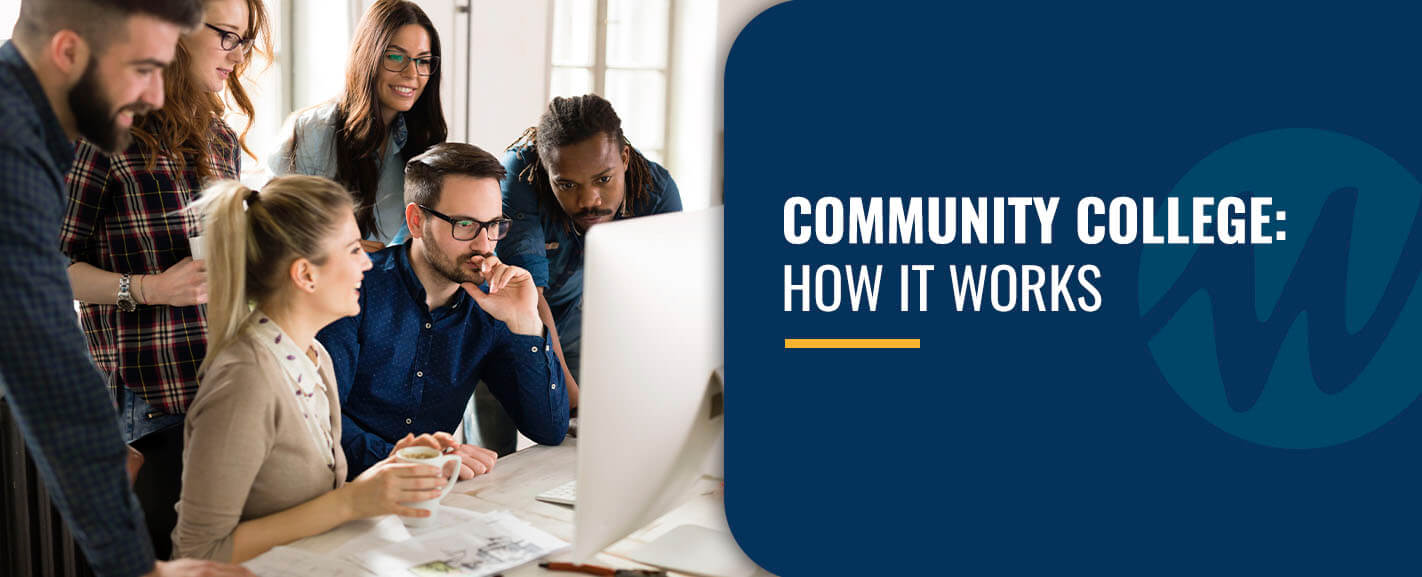
Other than the popular series about an unlikely group of misfits attending community college, community colleges don’t get much attention in popular culture, so many people aren’t sure how they work.
Firstly, you may hear people call community colleges two-year colleges because they award two-year degrees, called associate degrees. Or, some may call them junior college, as they can be a stepping stone to a four-year college or university. If you’re a nontraditional student, in particular, you may be wondering — what’s community college like, how does a community college work and why is going back to school valuable?
This guide should help answer some of the most common questions about how community college works.
Quick Links
- What Is a Community College?
- How Does Community College Work?
- Who Goes to Community College?
- How Much Does Community College Cost?
- What Can I Study in Community College?
- How Does Transferring to a Four-Year College Work?
- What Types of Jobs Are Available to Community College Graduates?
- What Are the Benefits of Attending a Community College?
- Attend Mount Wachusett Community College
What Is a Community College?
Community colleges aim to bring high-quality postsecondary education to students at an affordable price. In general, community colleges cost a small percentage of what four-year universities do, and they’re a particularly affordable option for in-state students.
What degree do you get from a community college? The highest degree awarded by community colleges is an associate degree, but they also offer certificates in a wide range of subjects. You can even choose to take individual classes at a community college if you’re interested in a topic or you’d like to add supplementary education to your resume.
While most four-year universities strive to keep their students in attendance, the goal of two-year colleges looks a little different. Many institutions have transfer programs with four-year institutions so students can get their associate degree and bachelor’s degree in less time. Some students only attend community college for one year until they transfer into a four-year university.
How Does Community College Work?

Community college works similarly to four-year universities and colleges. After getting accepted, schools invite students to enroll in classes. You can sign up for classes you are interested in and the right prerequisites. With many courses and blocks available, students can create the schedule that works best for them, allowing them to study around work schedules or childcare needs.
Community colleges also often have comprehensive student services, including academic resources, to help students build actionable schedules that support their goals and work toward their majors.
Who Goes to Community College?
Community college can provide opportunities for all kinds of students, from those just starting their higher education journeys to those returning after working or taking a hiatus. Community college often serves a very diverse student population, including:
- Recent high school graduates.
- Parents.
- Working professionals.
The flexibility and accessibility of community college enable many students to earn their degrees and education on their schedule and pace.
Community College Demographics
Of all undergraduate students in the United States, 40% attend community colleges. They’re a sensible choice for those who don’t want to or cannot leave their state to attend school, and many students work full- or part-time jobs during their enrollment. Some adults go back to school to change careers or seek to advance in their current field and need a degree or certificate to accomplish their goals.
Demographics differ by state and region, but the general enrollment demographics are:
- 7% Asian
- 13% Black
- 25% Hispanic
- 45% White
Additionally, 37% of community college students had a yearly income of less than $20,000.
What Is Community College For?

Individuals seeking a community college education and degree enroll in this schooling type for many reasons, adding more diversity to the student population. Some reasons people attend community college include:
- Preparing for college classes: Many students go to community college to ease into higher education and use it as a stepping stone. Whether they want to work toward their undergraduate degrees and transfer or figure things out with general education classes, community college is a great environment to adjust to higher education expectations and workloads.
- Deciding their major: Community college can also benefit students who are unsure what they want to major in. Because other colleges and universities are so expensive, tuition costs can deter students from taking risks and discovering their interests. At community college, students can decide if a field isn’t for them and try something new to determine the path that fits them.
- Changing their career: Individuals pursuing a career change can kickstart their education with community college. This option can connect students with the introductory materials they need to explore and understand their new fields or help people redirect in their existing fields. The low cost of community college gives individuals a great way to develop their careers and futures.
- Earning vital certifications: Students can also further their careers by earning certifications through community colleges. Verified courses in the programs provide a less expensive way for students to learn new skills needed for promotions or keep up with changing industries.
Community college is also a suitable option for part-time students. Whether students are parents or working full-time, community college often creates a more flexible environment that allows these students to earn their degrees on their time.
How Much Does Community College Cost?
Community colleges are an incredibly affordable option for many. Compared to four-year colleges, with an average tuition of $15,597 a year, two-year colleges cost $4,988. And even with the lower yearly costs, community colleges still offer financial aid, scholarships and grants.
A beneficial grant awarded to students who demonstrate financial need is the Federal Pell Grant. Unlike student loans, you don’t have to repay a Pell Grant. Every year, filling out the Free Application for Federal Student Aid will help you determine your eligibility for federal student aid based on your income, tuition and full- or part-time status.

What Types of Programs Do Community Colleges Offer?
Community colleges have a host of programs to serve their students’ needs. Two-year colleges have unique program offerings, from traditional liberal arts and STEM classes to developmental education and technical courses. For example, at Mount Wachusett Community College, we offer degrees and certificates in subjects like:
- Automotive Technology
- Communication and Media Arts
- Computer Science
- Education
- Health and Human Services
- Public, Social and Emergency Services
- Veterinary Technology
As you can see, community colleges offer a diverse range of programs, some of which you can’t get at four-year colleges. Developmental education courses in math and writing help students attain the necessary skills to enter introductory college courses. Some colleges also offer technical courses in automotive, HVAC, electrical and plumbing.
What Can I Study in Community College?
Regardless of your interests and passions, there is a community college out there that can help you get where you want to be. At The Mount, we offer over 70 different programs, allowing you to explore your interests and finally find the place where you thrive. Our programs include:
- Associate degrees: This traditional two-year path is where many people start their college journey, especially if they have little or no idea what career path they want to take. Others choose it because it allows them to get basic knowledge in their field and gain on-the-job experience while they pursue a bachelor’s or master’s degree in the future.
- Certificate programs: We all know that college training isn’t a requirement for every job. Still, many blue-collar careers require some sort of training or apprenticeship before you can strike out on your own. Our career certificates help students bridge that gap and work toward careers like electrician, technician and cannabis specialist. You can also explore our ed2go courses, which allow you to take affordable, asynchronous courses without enrolling in a degree program.
Our Fields of Study
At Mount Wachusett Community College, you’ll find learning opportunities in every field that can help you get your foot in the door, network and jump-start the career you’ve always wanted. Find degrees and certificates related to your passion in:
- Art: Reconnect with your inner artist and learn how to express yourself and break into industries in the arts and graphic design.
- Automotive: Work with your hands and gain a valuable skill that never goes out of style.
- Business: Study accounting, banking, business administration and more.
- Communication and media: Learn how to navigate, negotiate and communicate in any situation and industry.
- Computer and technology: The IT industry is constantly growing — get in on the ground floor of the latest advancements.
- Education: Whether you want to teach children to read or foster a passion that lasts a lifetime, our education track helps you get there.
- Health: Learn how to make your mark in the medical field as a nurse, paramedic or other professional.
- Liberal arts: Expand your knowledge base and learn a little bit of everything with our liberal arts degree.
- Public safety and service: Connect with and protect the community you love by gaining the education to start your career in criminal justice, pre-law, fire science or EMT training.
- STEM: Join the fresh, diverse voices entering the profitable fields of science, technology, engineering and mathematics.
- Veterinary technology: Human medicine isn’t the only way you can help — start your path to veterinary health with this degree program.
- Interdisciplinary studies: At MWCC, you can even take full control of your education and create a degree that’s right for you.
How Does Transferring to a Four-Year College Work?
Community colleges hope their students graduate with an associate degree, but they know many have aspirations to attain a bachelor’s degree as well. To meet their needs, community colleges form partnerships with four-year colleges and universities to make transferring easier.
The transfer relationship varies from school to school, but most community colleges strive to make the process as seamless as possible. They do this by creating courses that, in most cases, transfer directly to the four-year college’s curriculum. While not all credits always transfer, this relationship streamlines the process for students and helps them get their degrees sooner.
What Types of Jobs Are Available to Community College Graduates?

Community college graduates who don’t go on to receive a bachelor’s degree still have a host of great job opportunities. Most colleges offer career services centers, which help prepare students for the job market, write resumes and develop networking and interview skills.
If you’re a few years past the traditional college age, you may be asking yourself — is it worth going back to school at 40 or beyond? Many jobs require an associate degree as an entry-level requirement, opening more positions on the market to community college graduates. Some of the jobs with the highest projected job growth include computer user support specialists, bookkeepers, teacher assistants, nursing assistants and automotive service technicians.
What Are the Benefits of Attending a Community College?
There are countless benefits of going back to school and attending community college, including the low cost, opportunities for personal growth and higher salary and job prospects for those with more than a high school diploma.
Cost
The most significant benefit of community college is that you get a high-quality education — often, four-year college professors also teach courses at two-year colleges — for a much lower price. On average, the cost is almost one-third the price of attending a traditional university.
Job Opportunities
Attending community college for your associate degree or a certificate can increase your job prospects. You can even earn more money with an associate degree. On average, those who earn an associate degree make 13% more than those with a high school diploma. Additionally, community colleges have partnerships in the community and can even facilitate networking and interviews through job fairs.
Diverse Student Population
One fantastic feature of community colleges is that their student population is so diverse. Many students and two-year colleges fit into the category of nontraditional students. Since our student population has such varying needs, we offer assorted services to meet them, including options for child care, food pantries, tuition assistance and flexible class schedules.
Quality Education and Instructors
Many community college professors also teach at local four-year colleges and universities, serving as adjuncts at their community colleges. Because of this, students can receive quality educations from experienced college-level instructors for only a portion of the cost.
Our campus also boasts a smaller student-to-professor ratio, allowing our professors to get to know their students to provide better instruction and student services.
Attend Mount Wachusett Community College
For a community college that genuinely cares about you and your education, choose Mount Wachusett Community College. At The Mount, as our students and faculty affectionately call us, you’ll get a high-quality education at an affordable cost, with professors and administrative staff who want to see you succeed.
We have over 70 degree and certificate options, in addition to various focused career training programs. We also offer fully online degree and certificate programs for education with maximum flexibility.
Contact us for more information about our degree and certificate programs, or go straight to our free application. Not quite ready to apply? Schedule a personalized campus tour to see all of what our college has to offer. We hope to see you at The Mount soon!


